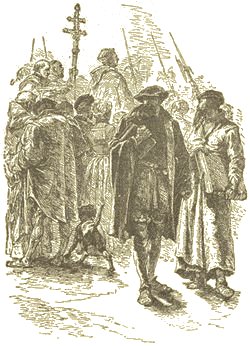John Calvin, born on July 10, 1509, in Noyon, France, was a seminal figure in the Protestant Reformation and the principal architect of Calvinism, a major branch of Protestant theology. Originally trained as a lawyer, Calvin's theological journey began in earnest after encountering the works of Martin Luther and other reformers. By the early 1530s, Calvin had embraced Protestantism and began to develop his own theological insights.
 Calvin's most influential work, "Institutes of the Christian Religion," first published in 1536, systematically presented his theological beliefs and laid the foundation for Reformed theology. This work emphasized the sovereignty of God, the doctrine of predestination, and the absolute authority of the Scriptures. Calvin's clear and comprehensive articulation of these ideas provided a robust framework for the emerging Reformed tradition.
Calvin's most influential work, "Institutes of the Christian Religion," first published in 1536, systematically presented his theological beliefs and laid the foundation for Reformed theology. This work emphasized the sovereignty of God, the doctrine of predestination, and the absolute authority of the Scriptures. Calvin's clear and comprehensive articulation of these ideas provided a robust framework for the emerging Reformed tradition.
 In 1536, Calvin settled in Geneva, Switzerland, where he played a crucial role in transforming the city into a center of Protestant reform. Despite initial resistance and a brief exile, Calvin returned to Geneva in 1541 and implemented significant religious and social reforms. He established a disciplined church structure, emphasizing the importance of moral conduct and communal responsibility. His governance model, characterized by a strict moral code and active church oversight, became a model for Reformed communities across Europe.
In 1536, Calvin settled in Geneva, Switzerland, where he played a crucial role in transforming the city into a center of Protestant reform. Despite initial resistance and a brief exile, Calvin returned to Geneva in 1541 and implemented significant religious and social reforms. He established a disciplined church structure, emphasizing the importance of moral conduct and communal responsibility. His governance model, characterized by a strict moral code and active church oversight, became a model for Reformed communities across Europe.
Calvin's influence extended beyond Geneva. His correspondence with reformers across Europe and his training of Protestant ministers helped spread Calvinist doctrines far and wide. His ideas took root in countries like France, Scotland, the Netherlands, and parts of Germany, profoundly shaping the religious landscape.
John Calvin's legacy is multifaceted. As a theologian, pastor, and reformer, his contributions to Protestantism were immense. His theological insights continue to be studied and debated, and his impact on the development of modern Christian thought remains significant. Calvin died on May 27, 1564, but his influence endures through the numerous Reformed churches and traditions that trace their roots to his teachings.
|
 Calvin's most influential work, "Institutes of the Christian Religion," first published in 1536, systematically presented his theological beliefs and laid the foundation for Reformed theology. This work emphasized the sovereignty of God, the doctrine of predestination, and the absolute authority of the Scriptures. Calvin's clear and comprehensive articulation of these ideas provided a robust framework for the emerging Reformed tradition.
Calvin's most influential work, "Institutes of the Christian Religion," first published in 1536, systematically presented his theological beliefs and laid the foundation for Reformed theology. This work emphasized the sovereignty of God, the doctrine of predestination, and the absolute authority of the Scriptures. Calvin's clear and comprehensive articulation of these ideas provided a robust framework for the emerging Reformed tradition.
 In 1536, Calvin settled in Geneva, Switzerland, where he played a crucial role in transforming the city into a center of Protestant reform. Despite initial resistance and a brief exile, Calvin returned to Geneva in 1541 and implemented significant religious and social reforms. He established a disciplined church structure, emphasizing the importance of moral conduct and communal responsibility. His governance model, characterized by a strict moral code and active church oversight, became a model for Reformed communities across Europe.
In 1536, Calvin settled in Geneva, Switzerland, where he played a crucial role in transforming the city into a center of Protestant reform. Despite initial resistance and a brief exile, Calvin returned to Geneva in 1541 and implemented significant religious and social reforms. He established a disciplined church structure, emphasizing the importance of moral conduct and communal responsibility. His governance model, characterized by a strict moral code and active church oversight, became a model for Reformed communities across Europe.






